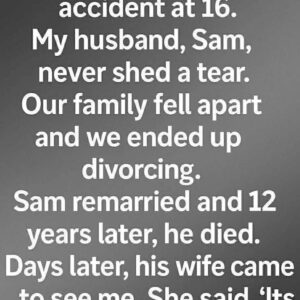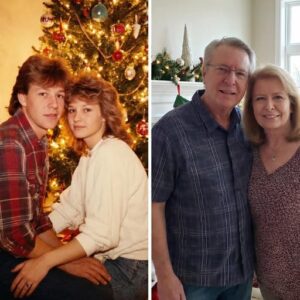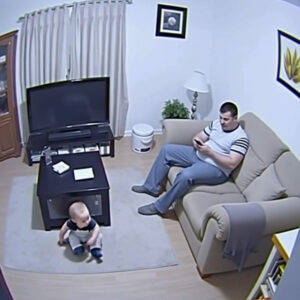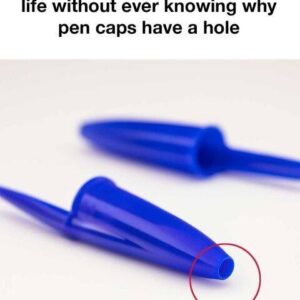Tatyana awoke at 6:45 a.m., like she normally does, thanks to her alarm clock. Monday. The kitchen smelled like oats, and Grandma was already awake.
It would seem that everything is like everyone else. But in reality, it is a little different.
Tatyana knew one thing from childhood, and it was reiterated to her several times: her father was a hero who died before she was born. So said her mother. So said her granny. And it was simple to believe.
Tatyana often assisted her grandma after school by going to the shop and carrying groceries. Grandmother’s legs were weakening as she grew older. They ate dinner together at a modest table.
And the catastrophe occurred unexpectedly.
The disease took her mother quickly. First, general weakness, then pain, an ambulance, examinations. The diagnosis was oncology. But when it became impossible, Tatyana began to take care of her mother: she held her hand in the ward, learned to cook, got certificates, called doctors. All this at the age of fourteen.
Mom passed away quietly, almost imperceptibly. After the funeral, she did not cry.The grandmother became the guardian. All the formalities were completed according to the law – documents, payments, benefits. And every evening she repeated:– Mom is with us now – looking down from heaven. You are not alone, Tanechka. We are together.
But this “together” was becoming significantly fragile.
The house became colder, even when the radiators were hot.
One evening, when Grandma was ironing clothes and Tatyana was pretending to read a textbook, a question that had been brewing inside her for a long time burst out of her chest:
— Why did mom and dad… both pass away?
Her voice trembled. It wasn’t a question, but a cry of pain.
Grandma shuddered and lowered the iron. A pause. Then a look – full of anxiety.
– Sometimes it happens. People leave early. But we are alive. We must live on.
“They both passd away.” She repeated them over and over again, as if hoping to understand the meaning.
The morning began as usual. Tatyana came to school early, wearing a worn jumper knitted by her grandmother.
But it was strange in the building. People were looking at her. Some were looking away, some were whispering. The teachers avoided her gaze.
With a mixture of sympathy and curiosity, she said:
– Listen, Tanyusha… Just don’t be offended, okay?.. But you know that your dad… didn’t pass away?
The heart stopped.
– What do you mean?
– Well, my mom saw some tramp in the park. He called himself Pavel. She said he used to be with your mom. Like… your dad.
The words fell into the void. “Alive.” “Pavel.” “Homeless.”
Tatyana wanted the truth at home one evening.
Initially, the grandma attempted to divert her in order to avoid the subject.
Pavel was Lena’s childhood pal. They grew up in the same hamlet and adored each other. He joined the army, promising to return. Six months later, a letter arrived: cold and callous. He refused both Lena and the child. I asked her to forget him.
Tatiana was born there. Pavel never showed up again. Lena did not look for him; there was nothing to forgive.
Then they heard that he got married, worked. Then – life turned upside down.
“That’s the kind of father you have, Tanya,” Grandma said quietly.
“But he’s nobody to you. You grew up without him. You became yourself – not because of him, but in spite of him.
The next day, as the police led the man to the car, he suddenly turned around. His gaze – clouded but familiar – pierced Tatyana right through.
He. It was him.
At home, grandma confirmed the terrible: yes, it was Pavel. Yes, he was alive. And yes, now he was homeless.
But he was alive. And he was her father.
On Monday, Tatyana came to school as usual – early, in an old jumper, with a backpack on her back. However, the atmosphere in the classroom had changed.
“The homeless woman has arrived,” rustled behind her as she took her place.
The nicknames poured out one after another: “the alcoholic’s daughter,” “the heiress of the garbage dump,” “the princess from the container.”
The teachers also began to keep their distance.
The worst part was that no one spoke up for her. No friend, no adult said, “It’s not your fault.”
Until this moment, Tatyana was considered one of the best students: responsible, inquisitive, diligent. But suddenly, threes appeared instead of fives, essay grades became lower, and answers in class became “unconvincing.”
The man in glasses, almost without looking at them, said:
— We would help… but the workload is heavy. And such children, with emotional instability, create tension in the team. We already have many problems.
There was no apology.
Tatyana left school and didn’t go home
Why? Why should she pay for other people’s mistakes? Why is her life falling apart just because she has such a father? She studies, helps, tries – why is this not enough?
“I am not my father. I am not guilty. Why should I suffer for this?”
“Adults can be stupid too,” Grandma said
– You will grow up, Tanyusha. You will forget all these people. Just don’t lose yourself. Do you hear? Don’t let yourself be betrayed.
These words became a lifeline.





